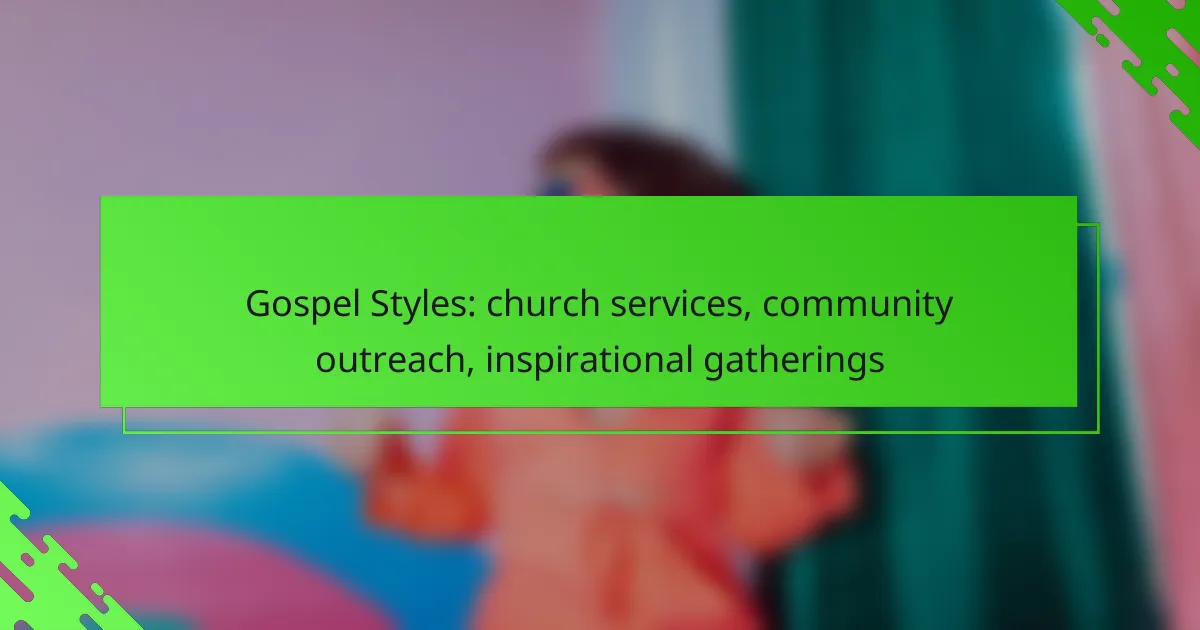Gospel styles play a crucial role in enriching church services by creating an engaging and participatory environment that fosters community connection. Through music, interactive elements, and outreach initiatives, these styles not only enhance worship experiences but also strengthen ties within the community. Inspirational gatherings further contribute to this sense of belonging, offering platforms for shared experiences and spiritual growth that unite individuals in their faith journey.

How do Gospel Styles enhance church services in the UK?
Gospel styles significantly enhance church services in the UK by fostering a vibrant atmosphere that encourages participation and community engagement. These styles incorporate music, interactive elements, and outreach activities that resonate with congregants and strengthen their connection to faith.
Contemporary worship music
Contemporary worship music plays a crucial role in modern church services, often blending traditional hymns with current musical styles. This approach appeals to a broader audience, particularly younger congregants, making worship more relatable and engaging.
Churches may incorporate various genres, such as pop, rock, or even hip-hop, to create a lively worship experience. Utilizing skilled musicians and vocalists can elevate the overall atmosphere, encouraging participation through singing and clapping.
Interactive sermon formats
Interactive sermon formats enhance engagement by inviting congregants to participate actively in the message. This can include Q&A sessions, small group discussions, or multimedia presentations that encourage dialogue and reflection.
Churches adopting these formats often find that they foster deeper understanding and retention of the sermon content. Incorporating technology, such as live polls or social media interactions, can further enrich the experience and connect attendees in real-time.
Community involvement activities
Community involvement activities are essential for building relationships both within and outside the church. These initiatives can range from volunteering at local shelters to organizing charity events, allowing congregants to live out their faith through service.
Churches in the UK often collaborate with local organizations to address community needs, creating a sense of purpose and unity. Engaging in these activities not only strengthens the church’s presence but also fosters a spirit of compassion and outreach among members.

What are effective community outreach strategies?
Effective community outreach strategies involve engaging with local populations through targeted initiatives that address their needs and foster relationships. These strategies can enhance community ties and promote the mission of the church while providing tangible support to those in need.
Food drives and charity events
Food drives and charity events are practical ways to support local communities. Organizing a food drive can involve collecting non-perishable items from congregation members and distributing them to food banks or shelters. Charity events, such as bake sales or benefit concerts, can raise funds to support local causes.
Consider setting specific goals for these initiatives, such as collecting a certain number of food items or raising a specific amount of money. Collaborating with local businesses for sponsorship can also enhance the impact of these events.
Partnerships with local organizations
Forming partnerships with local organizations can amplify the effectiveness of outreach efforts. By collaborating with schools, non-profits, or health services, churches can tap into existing networks and resources to better serve the community.
When establishing partnerships, ensure that the goals align with both the church’s mission and the partner organization’s objectives. Regular communication and joint planning can help maintain a strong relationship and ensure successful outcomes.
Volunteer programs for youth
Creating volunteer programs for youth can engage younger members of the community while addressing local needs. These programs can include activities like tutoring, park clean-ups, or assisting at local shelters, providing valuable experience and fostering a sense of responsibility.
To make these programs effective, offer training sessions and mentorship opportunities. Encourage youth to take leadership roles within their projects, which can enhance their skills and commitment to community service.

How can inspirational gatherings foster community?
Inspirational gatherings can significantly enhance community bonds by providing a platform for shared experiences, learning, and spiritual growth. These events create opportunities for individuals to connect, support one another, and engage in meaningful discussions that strengthen their collective identity.
Workshops and seminars
Workshops and seminars are effective tools for fostering community engagement. They offer participants hands-on learning experiences that can range from skill development to spiritual enrichment. For example, a workshop on conflict resolution can equip attendees with practical tools to navigate personal and community challenges.
When organizing these events, consider the interests and needs of your community. Aim for a mix of topics that appeal to different age groups and backgrounds. This inclusivity can enhance participation and foster a sense of belonging.
Guest speakers and testimonies
Inviting guest speakers and sharing personal testimonies can inspire and motivate community members. Speakers who share their journeys or expertise can provide fresh perspectives and encourage attendees to reflect on their own lives. Testimonies from community members can create a powerful sense of connection and shared experience.
To maximize impact, select speakers who resonate with your audience’s values and experiences. Encourage open dialogue after presentations to deepen connections and allow for personal reflections.
Prayer and meditation sessions
Prayer and meditation sessions offer a tranquil space for community members to come together in reflection and spiritual growth. These gatherings can help individuals find peace and clarity while fostering a collective sense of purpose. Regular sessions can strengthen community ties as members support each other’s spiritual journeys.
Consider varying the formats of these sessions, such as silent meditation, guided prayers, or group discussions. This variety can cater to different preferences and enhance participation, making the gatherings more inclusive and impactful.

What are the key elements of a successful Gospel event?
A successful Gospel event typically includes engaging speakers, inclusive activities, and accessible venues. These elements work together to create an uplifting environment that fosters community connection and spiritual growth.
Engaging speakers
Engaging speakers are crucial for capturing the audience’s attention and conveying the message effectively. They should possess strong communication skills and the ability to connect with diverse groups, often sharing personal stories that resonate with attendees.
Consider inviting speakers who have a background in community service or personal transformation, as their experiences can inspire and motivate the audience. Look for individuals who can adapt their message to suit different age groups and cultural backgrounds.
Inclusive activities
Inclusive activities are essential to ensure that all participants feel welcomed and valued. These can range from group discussions and workshops to music and art sessions that encourage creativity and collaboration.
When planning activities, consider the interests and needs of your community. Offering a variety of options, such as family-friendly events or youth-focused programs, can help engage a broader audience and foster a sense of belonging.
Accessible venues
Choosing accessible venues is vital for accommodating all attendees, including those with disabilities. Look for locations that provide adequate parking, public transport access, and facilities such as ramps and restrooms designed for accessibility.
Additionally, consider the size of the venue in relation to expected attendance. A space that comfortably fits the audience promotes a more intimate and engaging atmosphere, enhancing the overall experience of the Gospel event.

How do different Gospel Styles compare?
Different Gospel styles vary significantly in their approach to worship, community engagement, and overall atmosphere. Traditional styles often emphasize structured services and hymns, while contemporary styles tend to focus on modern music and informal gatherings.
Traditional vs contemporary styles
Traditional Gospel styles typically feature established hymns, formal liturgies, and a reverent atmosphere. These services often include choirs and organ music, creating a sense of continuity and connection to historical practices.
In contrast, contemporary Gospel styles embrace modern music genres, such as rock or pop, and often incorporate multimedia elements. Services may be more casual, encouraging participation through interactive worship and personal testimonies, appealing to a younger audience.
Regional variations in worship
Regional differences in Gospel styles reflect cultural influences and community values. For instance, Southern Gospel music is characterized by its four-part harmonies and storytelling lyrics, while urban Gospel often incorporates hip-hop elements and contemporary themes.
Churches in different areas may also adapt their outreach efforts based on local needs. For example, congregations in rural settings might focus on community service projects, while urban churches may prioritize social justice initiatives and advocacy.
Impact on congregation engagement
The style of Gospel worship can significantly influence congregation engagement. Traditional services may foster a deep sense of belonging among long-time members, while contemporary styles can attract newcomers seeking a more relatable experience.
To enhance engagement, churches should consider blending elements from both styles. For example, incorporating traditional hymns into a contemporary service can create a bridge between generations, encouraging participation from diverse age groups.
